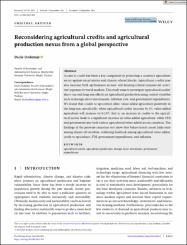Reconsidering agricultural credits and agricultural production nexus from a global perspective
Citation
Ozdemir, D. (2023). Reconsidering agricultural credits and agricultural production nexus from a global perspective. Food and Energy Security, 00, e504. https://doi.org/10.1002/fes3.504Abstract
Access to credit has been a key component in protecting a country's agriculture sector against uncertainties and climate-related shocks. Agricultural credits may also increase both agribusiness sectors' and farming-related commercial activities' exposure to world markets. This study aims to investigate agricultural credits' short-run and long-run effects on agricultural production using control variables such as foreign direct investments, inflation rate, and government expenditures. We found that credits to agriculture affect value-added agriculture positively in the long-run; specifically, when agricultural credits increase by 1%, value-added agriculture will increase by 0.19%; that is, an increase in credits to the agricultural sector leads to a significant increase in value-added agriculture, while FDI and government size both reduce agricultural value-added across countries. The findings of the pairwise causation test show that bidirectional causal links exist among almost all variables, validating feedback among agricultural value-added, credit to agriculture, FDI, government expenditures, and inflation.
This study investigates the impact of agricultural credits on agricultural production, considering factors like foreign direct investments, inflation rate, and government expenditures. The findings reveal a positive long-term relationship, indicating that a 1% increase in agricultural credits leads to a 0.19% increase in value-added agriculture, highlighting the significant role of credit in boosting agricultural productivity. However, foreign direct investment and government size were found to have adverse effects on agricultural value-added, with bidirectional causal links among several variables, demonstrating complex interactions within the agricultural sector.


















